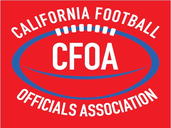‘Cheat sheets’ were discouraged during your school days, but they came in handy on the football field. Some officials’ pull out their game cards before the game, jot down the captain’s numbers, record which team won the toss and put the cards back in their pockets. They don’t look at it again until the second half unless a team takes a time-out in the first half. That’s an incredible waste of a potentially valuable resource.
The head coach, in your pregame with him, will provide you with captains’ names and numbers. Remember this year; the HC will notify the referee of the designated representative (coach or player) who will make the decisions regarding penalty acceptance or declination. Ask about trick plays or formations.
Umpires: Ask the head coach and get verification that all his players are properly and legally equipped by NFHS standards. Ask the HC if he has any player or anything that he would like you to look at.
Record the captains’ names and numbers. If you need a captains help in dealing with an exuberant or nearly out of control teammate, the captains will be more receptive/responsive if called by name, rather than by number
Jot down the results of the coin toss. Know who the ‘speaking’ captain is for each team. If the coach wanted his captain to defer his choice but the player chose to receive, you might mention that to the captain before its signaled official. Team captains choose to kick, be aware of this, and mention to the captain; no, you mean you wish to defer, (so they don’t have to kick both halves). Note on your game card that the team is KFC (kicking from the clock) – for the kicking team, (if that’s the case).
Log the number of the player who asks for a time-out and the quarter and the time on the clock when the timeout was granted.
Record the name and number of any ejected player or coach or anyone flagged for unsportsmanlike conduct (UNS).
Every official should note the down, distance and position of the ball (left hash, slightly right of the goalpost, etc) at the end of the first and third quarters. That information will prove valuable in helping you re-set the ball properly to start the second or fourth quarter (or overtime).
The game card may also provide a means of jotting down remainders for discussion at halftime of after the game (post game) – rule application or a mechanics question, mark it down.
If you find this information won’t fit/work on your game card, create your own or use an index card. For inclement weather, consider using a plastic bag, to help keep it dry in the elements.

